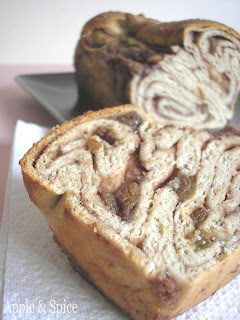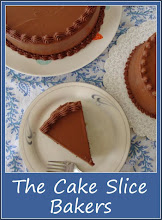The Daring Baker’s October 2011 challenge was Povitica, hosted by Jenni of The Gingered Whisk. Povitica is a traditional Eastern European Dessert Bread that is as lovely to look at as it is to eat!
Povitica, pronounced ‘po-va-teet-sa’ is traditional Eastern European dessert bread that is traditionally served during the holiday season. It is also known as Nutroll, Potica, Kalachi or Strudia. It is a heavy sweet bread that requires quite a bit of time, skill and patience to make, meaning they often sell for extortionate amounts. Povitica is quite unique and unlike any other kind of bread I’ve ever come across. It looks a little rustic on the outside, but once sliced, reveals the most amazing swirls of thin dough interlaced with sweet sticky filling. I love how its not even just one swirl, but two or three individual swirls in each slice. It really is quite extraordinary, a real show stopper!
The traditional filling for this bread is an English walnut filling, but we were allowed to choose our own flavours. Keeping with the nutty theme I decided to use ground pecans and chestnut puree. As the swirls created inside the bread reminded me of cinnamon rolls, I also added raisins and cinnamon which together with the nuts gave it a wonderfully flavoursome and festive flavour.
The bread itself is quite heavy, by which I mean by weight rather than texture. On average a loaf weighs an amazing 2.5 pounds, over 1.2kg! Despite this, it wasn’t dense, chewy or hard going, but surprisingly soft, moist and springy.
The gooey sticky filling was divine, faintly coarse from the nuts, creamy from the divine chestnut puree (I adore this stuff) and the cinnamon and sultanas adding little burst of fruity stickiness when bitten into. It tasted a bit like the filling for a praline chocolate, just fabulous! The small amount of cocoa didn’t add much to the flavour, but ensured a dark filling, helping to create the striking swirl effect within each slice.
I so nearly didn’t attempt this loaf, unsure how it would reproduce gluten free, as so far my bread based gluten free baking has been a bit hit and miss. I’m so pleased I decided to take the plunge and make this bread. It was absolutely fabulous and that moment of slicing into the loaf and revealing the swirls tucked away inside was one of pure delight. I was dancing round the kitchen in such a good mood – It worked!
Bing gluten free the dough was a little fragile to work with and probably a bit thicker than gluten-containing dough, but I’m more than happy with my results. I had a little bit of a scary moment thinking about getting it into the tin in one piece, but in the end I went for the classic, quick scoop and plonk method using my hands and it worked fine.
I enjoyed the bread so much than I’m planning on using the recipe again, only this time slicing the roll into rounds and baking them as sticky buns or cinnamon rolls. It was so good! Thanks so much Jenni for introducing me to this bread and pushing me out of my comfort zone!
Click here to see other Daring Bakers Povitica’s
Povitica with Pecan, Chestnut, Cinnamon, Raisin Filling
To Activate the Yeast
½ tsp caster sugar
½ tsp buckwheat flour
2 tbsp warm water
1½ tsp dry active yeast
Povitica Dough
120 ml whole milk
40g caster sugar
½ tsp salt
1 egg
25g unsalted Butter, melted
260g gluten free flour (100g buckwheat, 80g white teff, 80g brown rice flour)
2 tsp xanthan gum
Pecan, Chestnut, Cinnamon, Raisin Filling
50g pecans
40g sultanas
3 tbsp sweetened chestnut puree
50ml milk
50g butter
1 egg yolk
55g caster sugar
1 tsp cocoa powder
½ tsp cinnamon
To Activate the Yeast
In a small bowl, stir together the sugar, yeast and flour. Add the water and stir well. Leave to one side for 5 minutes until thick and foamy.
To Make the Dough
In a medium saucepan, heat the milk and sugar together until the milk is hot, but not boiling, and the butter melted. Set to one side and allow to cool for 5 minutes.
In a large bowl, mix the milk, egg, sugar and the salt until combined.
Add the flour mixture and xanthan gum and pour over the yeast mixture. Use a spatula to work the dough together into a thick paste. It may be slightly sticky. Beat the batter until smooth using the spatula, adding a little more flour if it seems particularly sticky, although it should still be soft.
Cover the bowl with the dough loosely with a layer of clingfilm and place somewhere warmish to rise for one and a half hours until risen and slightly puffed looking.
To Make the Filling
Grind the pecans with half the sugar in a food processor or spice grinder until very fine.
In a bowl, mix together the ground nuts, sugar, cinnamon, cocoa powder, raisins and chestnut puree. Heat the butter and milk together until the butter has melted and then pour over the filling mix and stir together well. Finally, beat in the egg yolk. It will be quite liquid.
Transfer to the fridge to cool and thicken slightly while the dough is proving.
Assembling the Dough
Thoroughly grease a 1lb (8 x 4.5") loaf tin well and line the base and up two sides with a long strip of greaseproof paper.
Spread a clean sheet over your entire work surface so that it is covered (I used two large overlapping sheets of clingfilm).
Sprinkle a couple of tablespoons of flour over the top and place the dough on the sheet and roll the dough out with a rolling pin, starting in the middle and working your way out, until you can’t get it any thinner. It should be very thin, as thin as you dare without breaking it.
Spoon the prepared filling evenly over dough and use a spatula or clean hands to spread it out into an even layer, covering the dough – it will still be very soft.
Lift the edge of the cloth/clingfilm and gently roll the dough up as if making a swiss roll. Try and keep it quite tight, using the clingfilm or sheet to help you lift and roll the dough.
Once the dough is rolled up into a rope, gently, curve one end up alongside the dough, while curving the other end down to create an ‘S’ shape of dough. This will give the dough its characteristic look when sliced.
Quickly scoop up the dough and place it into the loaf tin. Don’t worry too much about how it falls, as long as you keep it in its ‘S’ shape.
Brush the top of the loaf with any scrapes of leftover filling mixture (or a little milk and sugar if you prefer).
Allow the dough to rest for 15 minutes while you preheat the oven to 180C.
Once the oven is up to temperature, bake for 15 minutes before reducing the heat to 150C and baking for 45 minutes more. Cover the loaf with a sheet of foil for the last 15 minutes if it’s looking too brown.
Remove the bread from oven and leave to cool almost completely in the tin, before running a knife around the edge and turning out.
Serve in thick slices and marvel at the intricate swirled design of the bread and filling.
Eat within 3 days or store in the fridge and eat within a week – 10days.
Makes one Povitica loaf
Johannesburg's Rainbow Nation of Restaurants
1 hour ago










































